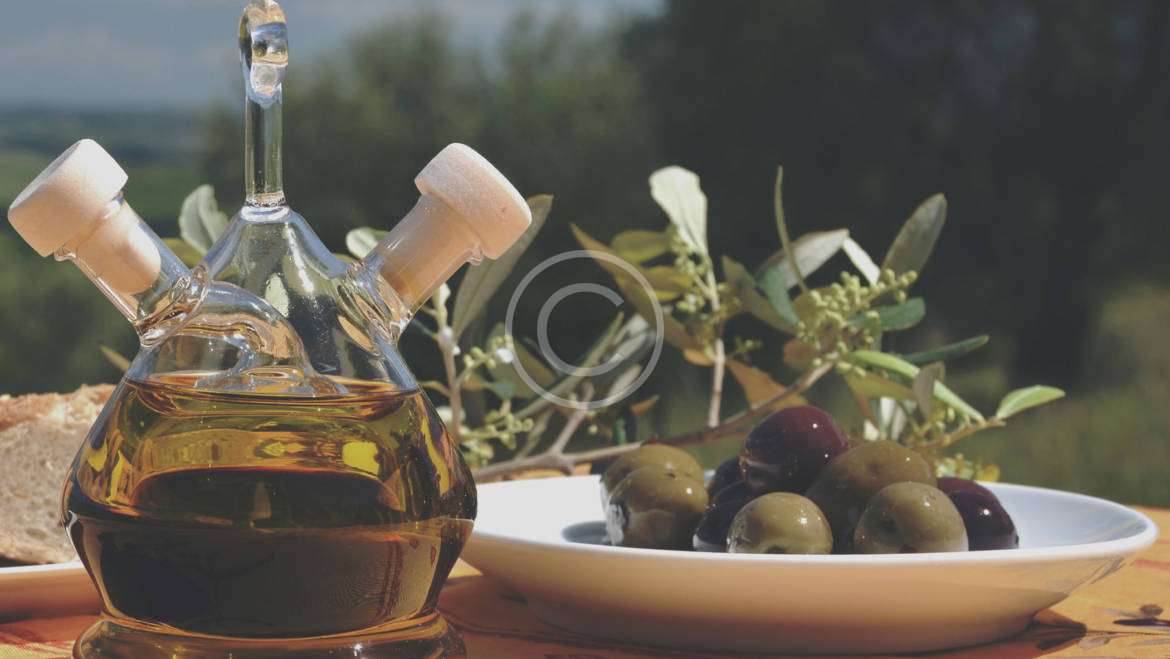Taste is a complex process and the combination of many factors together. In terms of oil, the taste memory of a human not accustomed to tasting procedures cannot maintain the flavour and aromatic characteristics of more than 4-5 olive oils at any given time. During the tasting procedure, we should not be overdone tasting many olive oils, because our taste buds cannot distinguish them.
HOW TO TRY THE OLIVE OIL
At first, it would be advisable in our taste judgments not to exceed the test of more than four different olive oils, so as not to cause “congestion” in our palate. We choose different olive oils from different regions of Greece (Peloponnese, Crete, Mytilene, Arta, Chalkidiki, Zante or Corfu), but belonging to the same species, e.g. be either extra virgin or virgin olive oils, and having approximately the same acidity.
1. Choose a clean, dry glass of wine with foot and tulip-shaped (like those for wine tasting) and add in each glass a small amount of the olive oil you have chosen to try.
2. Take the glass between your fingers embracing it with your entire palm. Spin the olive oil in the glass for a minute with one hand, with slow and steady circular motions, to “wet” its entire internal cavity. With the other hand cover and spin it once again. Remove your hand and approach your nose to the glass. In the first place, feel the aroma with slow and deep breaths.
3. Immediately after, taste a tiny sip. Extend the oil in the entire oral cavity with the help of the tongue, but do not swallow. Feel the oil originally on your tongue, then successively on the palate and throat. Keep it in your mouth for 1-2 seconds and then let it slip slowly between your teeth. Thus, the flavour of the olive oil will spread into your mouth and you will be able to “feel” its character. Remember that almost every part of the oral cavity receives different stimuli.
4. Try to describe the flavour and aroma of the olive oil you have just tried. Does it remind you of apple, nuts, fresh vegetables, hay, is it bitter, sweet, sharp and strong, lifeless and flat? Is it aggressive or mild, is it harsh, rugged, is it delicate, is it fresh, fruity, spicy, soft, balanced? Decide if, after all, you like what you have tried and proceed to tasting a second olive oil.
5. Before moving to the second tasting “clean” your mouth with a thin slice of apple, some water or some bread to have clear understanding about the next one; if you have pre-selected olive oil tasting proceed in the same way in another – different glass, starting from the first step to the last.
Also, you can try the olive oils you have, or even an olive oil with various foods so as to arrive at which one you prefer. The more austere the taste of foods that “accept” the olive oil, the more clearly you will feel its taste characteristics. Choose, then, slices of boiled or baked potatoes, barley bread or rusks, some slices of tomato, boiled zucchini, a piece of boiled fish, grilled eggplants.
The above test procedure will gradually familiarize you with the flavour characteristics of the various olive oils and soon you will have developed your own personal opinion and be able to evaluate oils from all over Greece, for your table and, maybe, your personal “cellar”.
In a country like Greece, where most individuals produce their own olive oil or are supplied olive oil from their own village or by some oil-producing relatives, it is difficult to talk about gastronomic characteristics of olive oil olive.
This is because most consumers are “addicted” to olive oils with a specific odour, flavour and aroma and is difficult to accept new taste experiences from different types of olive oils. However, it is very important to know that every olive oil has a close relationship with the cuisine of the place where it is produced and the different habits of local residents.
The flavour, for example, of a robust olive oil from Crete would surprise someone who is accustomed to taste a smoother in flavour, free-flowing oil from Mytilene. The most popular, practical and grand way to test the oil, as it runs hot and fresh from the olive oil factory’s decanters, is part of the tradition of all Greeks.

